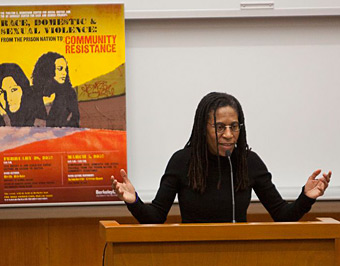By Andrew Cohen

Henderson Center for Social Justice. Photo credit:
Mona T. Brooks.
The Thelton E. Henderson Center for Social Justice has never shied away from difficult subjects, and its spring symposium—Race, Domestic, and Sexual Violence: From the Prison Nation to Community Resistance—was no exception.
Scholars, activists, and community members gathered recently to discuss the topic against the backdrop of a fast-growing U.S. prison system. The all-day symposium also explored alternatives to incarceration, including restorative justice and community-accountability programs, which lie outside the realm of law enforcement.
“Part of the Henderson Center’s mission is to elevate social justice issues that most people want to ignore or mischaracterize,” said Executive Director Wilda White ’83. “There are more perpetrators of sexual violence behind bars than ever before. We have become a prison nation, but the violence continues—especially against girls and women of color.”
According to University of Illinois-Chicago criminal justice and gender studies Professor Beth Richie, a well-intentioned strategy of the early anti-violence movement wound up harming minority communities. “Advocates generalized the problem to gain mass support, but that backfired against black women. It allowed people to deal with this type of violence as an individual, episodic issue, and to ignore root causes.”
As awareness of sexual abuse grew in mainstream communities, the emerging anti-violence leadership “looked just like the people in power making decisions,” said UCLA Law Professor Kimberle Crenshaw. “When we heard how celebrities and middle-class white women were also affected, black women fell out” of the class of people the anti-violence movement cared about. Crenshaw also said male police officers routinely use troubling justifications for violence against women including their own masculinity, sexual orientation, and personality.
Anti-Violence Strategies
Berkeley Law Professor Jonathan Simon ’87 urged participants to scrutinize the purported rationales behind current legislation and police policies—and to identify distortions. A prominent criminal law expert, Simon moderated a panel entitled “Coalitions and Contradictions: Gender Violence and Social Movements.”
“The supersizing of American prisons as a solution to many complex social problems has been labeled by critics as a ‘New Jim Crow’ intended to reverse the gains of the civil rights movement,” Simon said. “Incarceration was also built up through the activism of many people with far more positive motivations.”
In the 1970s, anti-violence activists “were ultimately pulled into an alliance with law enforcement to advocate for more arrests and punishments,” Simon said. “Today, the critical work of reassessing this history and developing anti-violence strategies that don’t feed the prison system are essential to reimagining social justice for the 21st century.”
Mimi Kim, a doctoral candidate at UC Berkeley’s School of Social Welfare, opened her presentation by quoting Simon’s acclaimed book Governing Through Crime: “Domestic violence has emerged over the last three decades as one of the clearest cases where a social movement has turned to criminalization as a primary tool of social justice.”
Kim described a successful program in Duluth, Minnesota, where close interaction among societal sectors produced an effective community response to sexual violence. But she also outlined the difficulties of replicating that model on a national scale. “What often begins as a hybrid partnership between civil society and the state often leads to subordination of civil society to the state,” Kim said. She stressed the importance of tapping “ways to confront this violence without engaging law enforcement.”
Picking up on that theme, Western Washington Professor Emily Thuma discussed research on the dangers of states’ capacity to imprison in the name of public safety. The results, she said, often point to “white safety at the peril of black criminality” and that “some forms of sexuality and violence are more or less tolerated than others.”
Long Beach State Associate Professor Clarissa Rojas argued that violence against immigrant women “hasn’t merited a response within the broader violence against women movement.” She and other panelists also called on activists to frame domestic violence as a health issue rather than simply a crime issue.